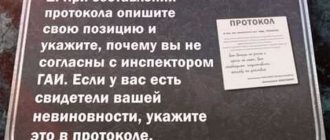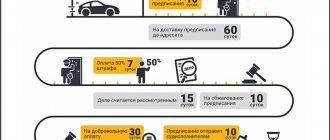Is it possible not to sign the protocol if you do not agree with the violation?
It’s possible, no one forbids it.
Moreover, traffic police inspectors cannot force you to sign a protocol if you do not want to. To sign it or not, to express agreement or disagreement is at your discretion.
However, the protocol, unlike a resolution on an administrative offense, does not in any way prove the driver’s guilt. It is needed only to record the circumstances of the event on the road. That is, the traffic police officer will indicate what the violation was on your part, and you have the right to express your opinion on this issue. For example, disagree with the alleged offense. They can’t stop you from doing this!
If you do not agree with the traffic violation, there is no point in refusing to sign the protocol. This will not make it invalid. If you refuse to sign, the state traffic inspector will simply indicate that you voluntarily refused to witness familiarization with the document. And no attesting witnesses are needed. The column for such an entry is precisely provided in the protocol.
Why indicate disagreement in documents?
But, if you plan to challenge a fine or other punishment in the future, you need to express your position in writing.
- Firstly, if you are really against the alleged traffic violation and punishment, there is no need to agree with it in writing. Otherwise, what is the point of further appeal? If you first confirm the fact of a violation, and then try to appeal the inspector’s decision in court, the judge will ask why you voluntarily wrote the consent?
- Secondly, disagreement in the form of the protocol on an administrative violation is the first step towards challenging the decision on guilt of the act. It itself, however, is not so important. What's more important is what comes next. Logically, you need to prepare evidence in favor of your innocence - video recordings, photos, witness statements, technical reports, and so on.
- Thirdly, you will have time to prepare for the process of appealing an administrative decision to the traffic police or in court.
The phrase “I do not agree” or, less succinctly, “I do not agree with the offense charged to me, no evidence of my guilt has been provided, I ask for the help of a defense lawyer” is enough.
If you are not sure of the detailed arguments, do not rush to write them down in the protocol. Moreover, this is not necessary. In such situations, the driver is stressed and cannot soberly assess all the circumstances of what happened. It is better to delay and watch the event in a calm environment.
I also advise you to verbally express your disagreement with bringing to administrative responsibility. Moreover, this must be done before the traffic police officer begins to fill out the resolution - it is drawn up first. If the form has not yet been filled out, there is a chance that the traffic inspector will change his mind and limit himself to a verbal remark.
Yes, this is rare! But in certain situations it can work in your favor. For example, you did not let a pedestrian pass, but the inspector does not have photos or videos of traffic violations, there are no witnesses, or simply many other important matters. Use communication skills. Moreover, you do not risk anything.
Pre-trial appeal
Some people think that it is better to go straight to court with their demands. But is this really so?
The Themis Institute, of course, is the latest and most important authority. However, we should not forget about the possibility of a peaceful pre-trial appeal.
In many cases, when officials issue a protocol on an offense, this means that further out-of-court proceedings are pending in the appropriate authority. In this case, you will be assigned a time and place for the hearing of the case, where you must arrive and defend your point of view.
For reliability, you can make an audio recording of the proceedings, but before that you need to make an announcement that a recording is being made and indicate information about the equipment. Only in this case can the file be used as evidence in court.
If the above methods did not help you defend your rights, and the decision of the relevant authority was not made in your favor, then it makes sense to go to court.
Why did the traffic police officer make the decision?
This obligation appeared in 2014 in connection with the introduction of amendments to the first part of Article 28.6 of the Code of Administrative Offenses of the Russian Federation under clause 87 of Art. 1 Federal Law No. 307 of October 14, 2014.
Since that time, traffic police officers have issued warnings and fines against drivers. The order continues in 2021. Now the inspector, in any case, issues a resolution, and only if you disagree with the traffic violation, draws up a protocol.
That is, you will not be able to avoid the ruling in any case. An exception will be actions for which the driver's license may be revoked or administrative arrest (drunken driving, leaving the scene of an accident, driving into oncoming traffic, etc.). Based on the results of the offense, a protocol is drawn up here and then transferred to the traffic police department for consideration by higher officials (Article 23.3 of the Code of Administrative Offenses of the Russian Federation).
In essence, a resolution is a fine issued right on the spot. Even if you do not agree, it will be drawn up in any case - these are the regulations. Another issue is that the decision can be appealed. But for this it makes sense to draw up a protocol on an administrative offense.
What does an objection to a protocol on an administrative offense look like?
The reason is usually the discovery of signs of an offense at the scene of its commission, statements of any persons, messages from law enforcement agencies, the media, video recording.
The case is considered initiated from the moment the protocol, ruling (if an investigation is required) or resolution is prepared.
When a violation of traffic rules causes harm to life or health, an inspection of the site of the administrative offense is mandatory. The protocol is drawn up immediately.
The Code of Administrative Offenses of the Russian Federation also provides that punishment can be imposed without drawing up a document recording the offense. When a warning or fine is applied, a resolution is immediately drawn up.
In difficult situations (antitrust, insurance, patent, etc. legislation), an administrative investigation may be ordered. The period is 1 month, it can be extended. Upon completion, a protocol on the identification of violations is drawn up or the proceedings are terminated.
Further, the consideration of the case of an administrative offense is carried out in accordance with the general procedure.
- Protocol on administrative violation. FSSP sample. (Appendix No. 134 to Order of the Federal Bailiff Service of Russia dated July 11, 2012 No. 318)
- Sample protocol on an administrative offense in the field of traffic in Moscow (Appendix 5 to the Order of the Department of Transport and Development of Road Transport Infrastructure of the City of Moscow dated May 12, 2011 N 61-02-63/1)
- Protocol on administrative violation. FAS sample (Appendix No. 6 to the Regulations for the preparation and conduct of cases of administrative offenses in the central office of the FAS Russia)
- Protocol on an administrative offense (violation of electoral rights) (Appendix 2 to the Recommendations on certain issues of application of the Code of the Russian Federation on Administrative Offenses by election commissions)
- Protocol on administrative offenses in the field of road traffic (Appendix No. 6 to the Administrative Regulations of the Ministry of Internal Affairs of the Russian Federation for the execution of the state function of control and supervision of compliance by road users with requirements in the field of ensuring road safety)
- Protocol on administrative violation. Rostekhnadzor sample (Appendix No. 1 to Order of the Federal Service for Environmental, Technological and Nuclear Supervision dated September 26, 2014 No. 442)
- Protocol on administrative violation. Sample of the Moscow Municipal Internal Affairs Directorate (Appendix No. 1 to the Order of the Moscow Municipal Internal Affairs Directorate of April 28, 2006 No. 261)
- Determination to initiate a case of an administrative offense and conduct an administrative investigation (Appendix No. 16 to the Administrative Regulations of the Ministry of Internal Affairs of the Russian Federation for the execution of the state function of control and supervision of compliance by road users with requirements in the field of ensuring road safety)
- Determination of refusal to initiate a case of an administrative offense (Appendix No. 17 to the Administrative Regulations of the Ministry of Internal Affairs of the Russian Federation for the execution of the state function of control and supervision of compliance by road users with requirements in the field of ensuring road safety)
Alexander Otrokhov, Legal, 04/15/2015
The protocol contains information about the persons who committed the offense and sets out in detail the circumstances of the violation. It is impossible to appeal this procedural document, but the law allows you to file an objection to it in cases where inaccuracies or contradictions with the norms of substantive and procedural law are found in it.
Making a complaint
https://www.youtube.com/watch?v=ytcopyright
If the plaintiff in the case has made demands, then the defendant or interested parties have the right, in accordance with paragraph 2 of Art. 2 135 of the Code of Administrative Proceedings (CAS RF) to file your objection to them.
We invite you to familiarize yourself with: Sample complaint to the FAS about the actions of the customer - sample under 44-FZ in 2021
In the event that an official accepts the plaintiff’s arguments in some part or in full, he can draw up his own review.
If an illegal action has been committed against a person or an inaction has been committed, then in order to protect his legal rights he can file a complaint in an administrative case to an authorized authority.
The legislation provides for general and special administrative complaints. A general complaint is submitted by any citizen to an authorized body or a higher official. The special one is distinguished by the procedure for filing, registration and subsequent consideration provided for in the relevant norms and rules of the current legislation.
If an administrative offense has been committed, a protocol is first drawn up against the offender, which will become the basis for initiating a process and issuing an appropriate resolution.
The current legislation gives the opportunity to a citizen against whom a penalty has been imposed to make his own comment on the protocol. It is not easy to do this on your own, since it will not be enough to list the points with which the interested person disagrees, but you must indicate exactly why these provisions of the protocol violate his rights and interests, and the norms of the law.
Drawing up a protocol
An objection to the protocol is drawn up in the following cases:
- Violations of procedural issues. If, for example, a police officer, despite the request of the party, did not interrogate and identify witnesses to the incident. This would be a serious violation of procedural rules, which could lead to an incorrect decision in the case.
- Material misrepresentation of factual events. This refers to an incorrectly specified place or time, as well as to the presentation of circumstances that did not actually occur.
Note! A record refers to a formal document drawn up by an official in the performance of his duties. That is why there cannot be unverified or incorrect facts in it.
If even a simple mistake was made when drawing up this document, this could lead to either the imposition of an unjustified punishment, or to the unlawful termination of the case and the non-application of preventive measures against the offender. That is why before signing you need to carefully and even several times study this document. After discovering inaccurate or unreliable data, you must immediately, without delaying time, draw up and submit a formal objection.
We must always remember that if false data is discovered, there is a high probability that the subsequently imposed penalty will be canceled in court.
Sample complaint
The protocol, in addition to information about the incident itself, may include various diagrams, data from examinations performed, or other arguments. For example, a person accused of committing a traffic violation may question the completeness, reliability and correctness of this information. For example, after an accident, a medical examination of the victim was carried out, which established that he had a mild injury.
Note! The law does not establish specific deadlines for an individual to submit comments on the protocol. But, based on the meaning of the norms of the CAS of the Russian Federation, it is possible to appeal the entries in the protocol within the two-month period that is generally allocated for the consideration of an administrative case.
The objection is drawn up in any form, but the generally accepted structure is followed, including:
- information about the judge, administrative body or official hearing the case;
- the main violations that were committed by the official when drawing up this document;
- a request to the body or official considering the objection;
- applications confirming the arguments of the individual who filed the objection;
- date of compilation and signature.
The "header" indicates
To the Rospotrebnadzor department
in the Moscow region
from IP Ivankova A.A.
Objections
on the protocol on administrative offense No. of 2018
On June 1, 2021, a management specialist (full name of the official) drew up administrative protocol No. against me for the sale of goods of inadequate quality under Article 14.4 of the Code of Administrative Offenses of the Russian Federation.
My last name was incorrectly indicated in the protocol (Ivanova, instead of Ivankov). In addition, no one confiscated any goods from me for quality control. The protocol stated that I refused to give any explanations, but in fact no one asked me for any explanations, which the witnesses nearby (my seller and the loader) could confirm. The protocol did not reflect that the official who compiled it explained to me the provisions provided for in Art. 25.1 Code of Administrative Offenses of the Russian Federation procedural rights.
I ask you to take into account these circumstances when considering the administrative case initiated against me.
07/05/2018
Ivankova A.A.: (signature)
Objections are sent to the appropriate official, to whom the official who compiled the protocol reports, by registered mail with return receipt requested, or sent in person to the reception or office of this organization. The second copy is kept for yourself.
According to Part 1 of Article 26.3 of the Code of Administrative Offenses of the Russian Federation, the explanations of a person against whom proceedings are being conducted for an administrative offense constitute information relevant to the case and communicated orally or in writing.
In accordance with Article 26.2 of the Code of Administrative Offenses of the Russian Federation, explanations in a case of an administrative offense act as evidence in a case of an administrative offense and can play both a positive and negative role in the decision-making process in the case.
Is the inspector required to draw up a protocol?
Yes, I must.
If you do not agree with the event of an offense or the administrative punishment for it, the traffic police inspector must record these circumstances and draw up a protocol on a unified form - by virtue of Part 2 of Art. 28.6 Code of Administrative Offenses of the Russian Federation.
The law even allows for an extension of the deadline for drawing up the protocol. For example, if inspectors need time to find out the circumstances or information about the participants in a given violation. Two days are allotted for this (Part 2 of Article 28.5 of the Code of Administrative Offenses of the Russian Federation).
As we found out, in the protocol, and not in the resolution, the driver has the right to express disagreement and describe his vision of the situation. If a traffic police officer refuses to draw up a report, this is a violation on his part.
True, the inspector will issue a resolution in any case. Then you need to indicate the refusal to draw up a protocol directly on the form (for example, below). Subsequently, on this basis, it will be possible to appeal the decision in court.
Deadlines
In these cases, the issue of time is very important.
Thus, a protocol must be drawn up immediately at the scene of the offense. If collection of missing information is required, this process can be delayed for up to 2 days.
If the protocol is drawn up in your absence, subject to proper notice, a copy must be sent to you within 3 days.
The total period for consideration of a case is 15 days, in court - 2 months, with the exception of certain categories of cases (for example, in the field of electoral law).
We invite you to read: Administrative responsibility of local government deputies
What to do if you don't agree?
Appeal to the traffic police or go to the district court.
In practice it looks like this.
- On the road, a traffic police officer stops you and charges you with an offense, which you categorically disagree with (no matter the event or the punishment).
- Notify the inspector that you disagree with his decision (before issuing a resolution).
- Wait for the traffic police inspector to fill out the decision form. Read the document carefully and sign.
- The inspector will draw up a protocol on the administrative violation. You also need to read it and then fill out the “Explanations and Notes” field. Please indicate that you do not agree with the violation charged to you. If possible, with details, facts, links to articles.
- Get a copy of the decision from the inspector.
- Next, be sure to submit a complaint to the traffic police department or to the court within 10 days: in person or by registered mail by mail (Clause 1 of Article 30.3 of the Code of Administrative Offenses of the Russian Federation). Of course, with evidence in favor of your innocence or procedural violations on the part of the traffic inspector. For your convenience, the resolution will in any case contain a memo with instructions and coordinates of the State Traffic Inspectorate.
You have a slightly better chance if you go directly to the district court. Especially if you have collected significant evidence or attracted a lawyer. This will increase the chances of successfully appealing the decision. But you shouldn’t have any illusions either. Courts often side with traffic police inspectors. And they formulate this by saying that they have no reason not to trust government officials.
Pre-trial appeal
There are cases in which a decision is made only by this body (for which a sanction is possible in the form of deprivation of a driver’s license, suspension of activity, administrative arrest, etc.).
Based on the results, the judge imposes a punishment or terminates the case due to exceptional circumstances.
For other categories of cases, final acts are authorized to be drawn up by bodies that identify these offenses (OVD, prosecutor's office, Rospotrebnadzor, tax inspectorates, customs authorities, FAS authorities, etc.) In such cases, the court considers complaints against these decisions as a second instance.
The Code of Administrative Offenses of the Russian Federation provides that the total appeal period is 10 days. If it is missed, you can apply for reinstatement in court.
The complaint is submitted to the body that issued the decision. It is he who is obliged to send it within 3 days to a higher authority.
Important note: you do not need to pay a state fee.
Based on the results of consideration of the complaint, the court makes a decision, which can also be challenged in a higher authority in the same manner.
Conclusions on the article
- If you do not agree with the traffic violation, you do not have to sign the protocol.
- In this case, the inspector will indicate that the driver did not sign the document.
- Disagreement with the offense charged to you can be expressed directly in the administrative protocol - in fact, with the simple phrase “I do not agree.” Or you can describe the arguments and point out violations on the part of the traffic inspector.
- First, a fine is issued, and if the driver disagrees, a violation report is issued. It is advisable to sign both documents.
- It is not the protocol that is subject to appeal through the traffic police or the court, but the decision on a fine, arrest, or deprivation of rights.









